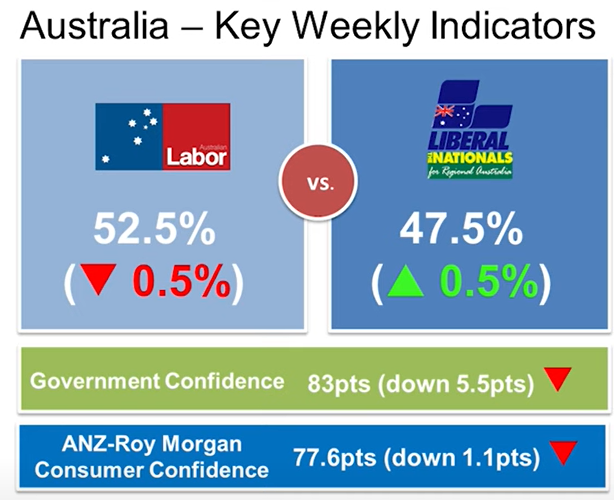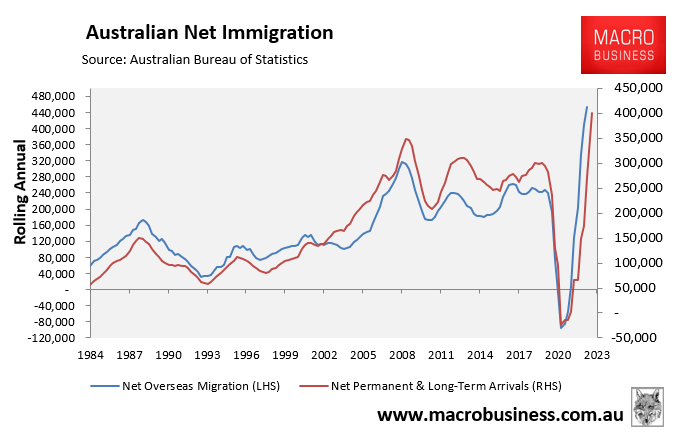The latest Roy Morgan Research poll of voting intentions showed that the Albanese Government is quickly losing voter support, with its two-party preferred vote falling to just 52.5% and confidence in the government falling to record lows:

This week, the Australian Bureau of Statistics (ABS) released its official net overseas migration data for the March quarter, as well as its monthly net permanent and long-term arrivals data to July, both of which hit all-time highs:

On Thursday morning, I sat down to speak with 2GB’s Luke Grant as part of our weekly Treasury of Common Sense segment.
In this week’s episode, I explained how the Albanese Government is dooming itself to electoral oblivion by running such an extreme immigration program and, in the process, angering Australians by delivering a rental crisis, rising unemployment, and real wage losses.
Below are some key highlights from the interview. You can listen to the full audio version below.
This crisis in housing is caused by the federal government basically running immigration way too hard. Just a quick reminder, last week’s national accounts for the June quarter said that Australia’s population grew by 626,000 people last financial year. Now that’s like adding a Canberra and a Hobart in a year to the nation’s population.
Obviously, when you run numbers like that you’re going to have a housing problem. That’s why we’ve got rental vacancy rates at record lows, the double digit rental rises across the capital cities, we’ve got people being forced to live in group housing or becoming homeless.
We’ve all read the articles, we’ve all seen the stories. And this is basically directly caused by the federal government’s huge immigration program. So they just need to basically pair it back. It’s not rocket science, it’s completely logical.
It’s just so logical for pretty much anyone who doesn’t have a vested interest in this to see what we’re doing is wrong.
It’s not just about housing, it’s obviously about infrastructure as well. We’ve got infrastructure shortages everywhere. Schools and hospitals, you name it.
We’ve grown the population by 7.4 million people this century, which is an extraordinary amount of people in a short period of time.
We’ve all seen the result. We’ve seen housing shortages. We’ve seen infrastructure problems. We’ve got shortages across schools and hospitals. And soon we’ll have water supply shortages once the next drought kicks in like we did four years ago.
Basically, immigration is the everything problem. It’s run too hot. I mean, it doesn’t have to be a problem, but unfortunately when you run it as aggressively as we have been since 2005, it becomes a problem.
It’s a bit like salt. Adding a little bit of salt to your dish is good and it makes it taste better. But if you add too much, it ruins it. And if you add ridiculous amounts, it becomes toxic. And I think we’re sort of at that toxic level at the moment where it’s just way way too much.
[Roy Morgan’s unemployment estimate] is at its highest level since March 2021 during the middle of the pandemic. Unemployment’s now rising very quickly according to the survey.
The explanation of it is not that we’re not creating jobs. We created 161 000 jobs in the last year according to Roy Morgan. The problem is again this immigration issue. We’ve had record labour supply growth in the last year of nearly 500 000. [But] we’ve created 161 000 jobs.
That difference is what’s driving up unemployment. And effectively what it’s saying is if we keep doing this, if we keep bringing all these workers, we don’t have the demand for those workers, because the economy is slowing because of the RBA rate hikes.
What we’re going to have is higher unemployment and this is dynamite for the federal government because they’ve effectively created a rental crisis which has got a lot of people very angry, and rightfully so.
We’ve got real wages falling at the fastest pace in history, so they’re angry about that. That’s mostly due to the high inflation, but it’s also partly due to this mass population growth, which has kept the lid on wage growth.
And then now we’ve got rising unemployment because of this huge surge in immigration.
There just isn’t the demand to soak up these people. There’s not the homes to house them. There isn’t the infrastructure to cater for them. And this is basically going to create a real problem for the federal government.
There is a lot more discussion in the interview:
Subscribe to my YouTube channel to access all of my media interviews.

